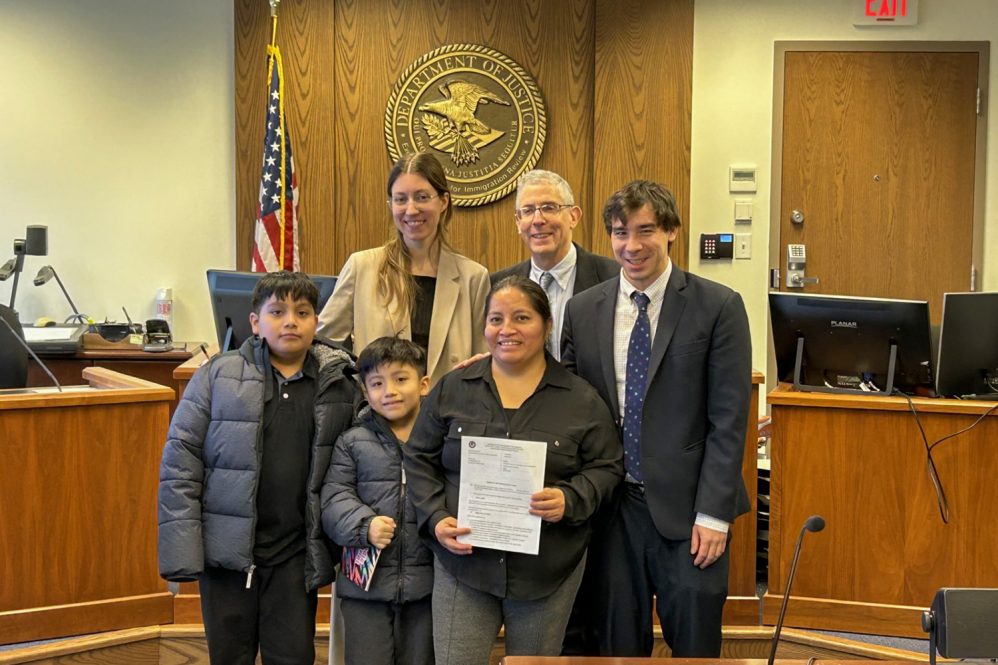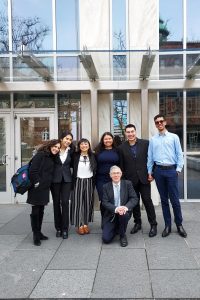The Asylum and Human Rights Clinic helps immigrants along the path to a new life and provides law students with practical, hands-on experience.

Pabla Francisco Alonzo, holding document, with her two sons. Behind her, from left, are: Zoe Allison '25, Professor Jon Bauer, and Anthony Shimamoto '24.
Whenever Pabla Francisco Alonzo sees a UConn sign or the husky logo, she is filled with gratitude for the work of the Asylum and Human Rights Clinic at the UConn School of Law.
"I remember the great company that I had, the good representation that I received from the university," she said, speaking through an interpreter. "I'm very grateful."
The clinic won a grant of asylum in February 2024 for Francisco Alonzo, an indigenous human rights defender who fled Guatemala after she and her baby were threatened with death at gunpoint. The incident was the culmination of years of escalating threats and attempts on her life because of her campaign for justice in the murder of Andrés Pedro Miguel, an indigenous environmental activist.
Julián Ariza Lozano, a 25-year-old Colombian activist and journalist who was persecuted for his sexual orientation and political activity, also won a grant of asylum in March 2024 with help from the Asylum and Human Rights Clinic. Colombian police chased, shot and wounded him at a protest he covered as a journalist, and he received death threats targeting him for being gay and for his journalistic activities.
"I'm really grateful to the United States and to the Asylum Clinic for helping me and making my life better," Ariza Lozano said. He remembers the day he waited in immigration court to hear whether he had been granted asylum. "That day, I was praying," he said. "I don't know what the word for very, very happy is, but I was muy feliz, muy feliz."
Francisco Alonzo and Ariza Lozano were among 14 clients of the clinic who gained lawful immigration status in the United States over the past year for themselves and 23 relatives. Since its founding in 2002, the clinic has won grants of asylum or related forms of relief for nearly 300 individuals in 168 successful hearings.
Each case is a team effort, with two students assigned to each client. They work under the supervision of Professors Jon Bauer and Diana Blank to interview their client, document the client's story, prepare briefs and other legal documents, and advocate for the client in immigration court.
Hollianne Lao '25 represented Ariza Lozano with Natalie Casanova '25. The evidentiary packet of documents they prepared in the case reached about 500 pages, the product of extensive research and interviews of Ariza Lozano, his family, one of his colleagues, medical and psychological experts, and an expert on Colombian politics and cultural norms. They also mooted the case, holding multiple mock sessions with Bauer and Blank to prepare for questions that might arise in court.
"Working in the clinic is a great experience for anyone who wants to use their legal experience to help other people," Lao said. "At the end of the day, you're helping someone, no matter how the case turns out."
Zoe Allison '25, who represented Francisco Alonzo with Anthony Shimamoto '24, entered UConn Law after working with IRIS - Integrated Refugee and Immigrant Services - helping resettle refugees, many of them from Afghanistan. She wasn't sure at first that she would enroll in the Asylum and Human Rights Clinic, having felt emotionally drained by her experience with IRIS, but she ultimately found the clinic experience deeply rewarding.
"It was really humbling and empowering for me," she said, "just proving to myself that I could do this amount of work and ultimately be successful."
In both cases, the students credited fellow law student Enrique Lopez Ramirez for his crucial work interpreting for them. Lopez represented a client from Afghanistan in the Asylum and Human Rights Clinic in his second year of law school and won an asylum grant in immigration court for a client from Honduras in his third year. After earning his JD in 2023, he continued his legal education as an LLM student and continued to work with the clinic as a Spanish-language interpreter.
Having both experiences — working directly with clients and as an interpreter — left him with a strong sense of how complex, challenging and ultimately meaningful the clinic's work is.
"I love the clinic. That's why I kept doing it," said Lopez, who is now a fellow with the Immigrant Justice Corps, representing migrants in El Paso, Texas. "The clinic really prepared me for the job I have right now."
"The student teams in these two cases put their heart and soul into the work," said Bauer, the clinic's director. "They sensitively interviewed clients who had survived horrible experiences, tirelessly investigated the facts and researched the law, wrote first-rate briefs and other filings, and engaged in compelling courtroom advocacy."
For the clinic's clients, the future is transformed. Francisco Alonzo is taking driving lessons, looking for work and learning English by practicing with books, movies, videos and conversations with her children. Already she can manage without an interpreter in routine matters.
"I understand the basics, but I want to enrich my vocabulary, and I feel that I can do it," she said.
Ariza Lozano is settling into his new country with his husband and their cat, learning English and working toward a dream vacation - a trip to Europe. He wants to build their credit, buy a house and adopt children.
"I want to thank the University of Connecticut from the depths of my soul for the good fortune of being in this country, where I live in peace with my family," Ariza Lozano said. In the United States, he said, he can "tell my story, and not feel shame or suffer for being gay."






